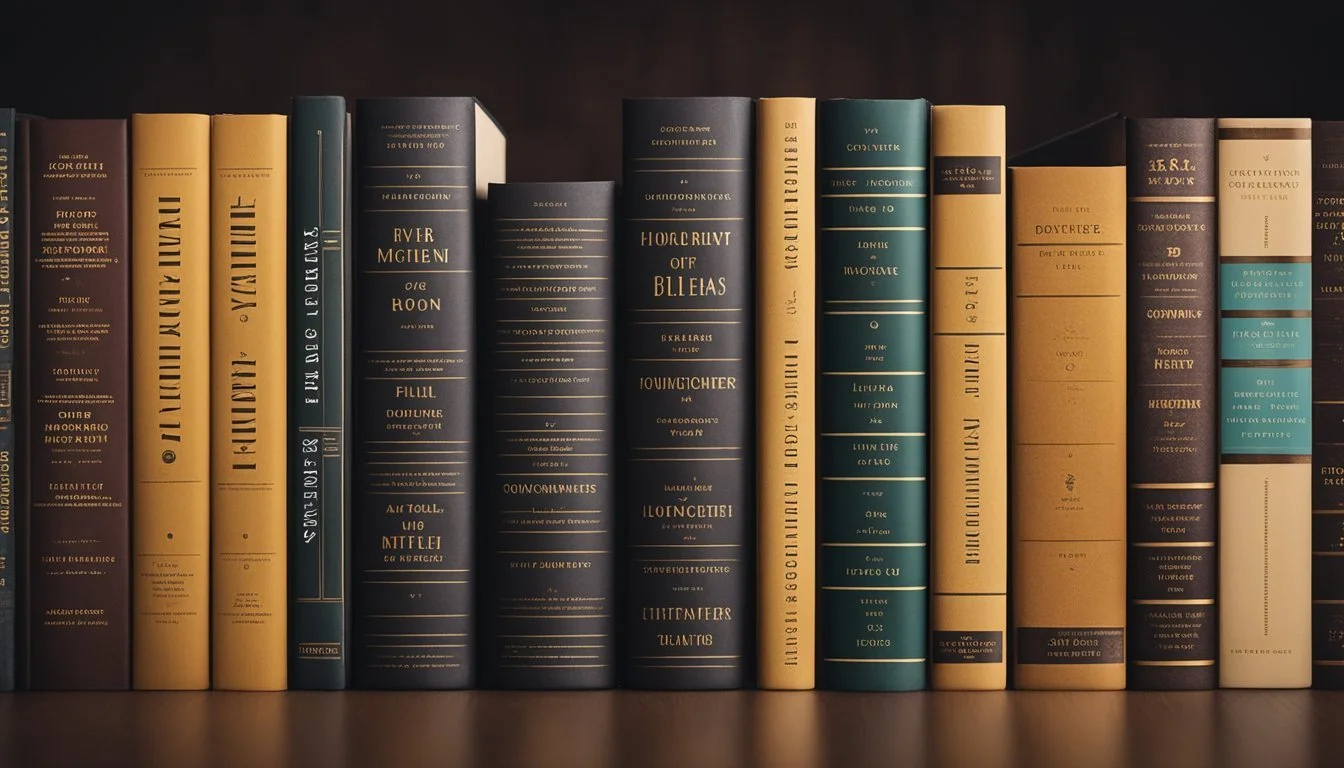13 Documentaries on Literary Icons of the 20th Century
Celebrating Masterful Storytellers
The 20th century was a remarkable period for literature, witnessing the rise of numerous influential writers whose works have left an indelible mark on society. Documentaries about these literary icons not only offer an intimate glimpse into their lives but also provide context for their enduring legacy.
These films reveal the intricate relationships between the authors' personal experiences and their literary masterpieces, offering valuable insights for enthusiasts and scholars alike. Through these visual narratives, viewers can explore the profound impact these writers have had on shaping modern literature and cultural thought.
1) "There's no friend as loyal as a book." - Ernest Hemingway
Ernest Hemingway, a towering figure in American literature, famously stated, "There is no friend as loyal as a book." This quote encapsulates his immense love and respect for literature.
He regarded books as steadfast companions that offer solace, wisdom, and enduring presence.
For Hemingway, literature was not just a profession but a source of personal stability and loyalty. His own works, such as "A Farewell to Arms" and "The Old Man and the Sea," embody his dedication to creating enduring literary friendships for readers.
Hemingway's deep bond with books is a testament to the timeless value literature holds in human lives. To explore more about his literary journey, watch Ernest Hemingway: Rivers to the Sea (2021).
2) Ernest Hemingway: Rivers to the Sea (2005)
"Ernest Hemingway: Rivers to the Sea" (2005) is a documentary that sheds light on the life and works of Ernest Hemingway, one of America's most influential writers.
The film explores Hemingway's economical and understated writing style, known as the iceberg theory, which has profoundly impacted 20th-century fiction.
Hemingway's dynamic public image and adventurous lifestyle are also key themes in the documentary, highlighting how his personal experiences influenced his literary creations.
This documentary is part of the American Masters series and provides insights into the critical success of Hemingway's novel "The Sun Also Rises."
For more information on the film, visit its IMDb page.
3) Hemingway's Havana
Ernest Hemingway's connection to Havana is vividly explored in several documentaries, shedding light on his life and legacy in the Cuban capital.
One significant documentary is "Hemingway: A Portrait," which delves into his years at Finca Vigía, his home in Cuba that has now become a museum. This film provides a comprehensive view of his daily life and writing process in Havana. Hemingway: A Portrait (2007)
"Ernest Hemingway: Rivers to the Sea" is another important work. It emphasizes Hemingway's relationships with local fishermen and his admiration for the Cuban way of life. The documentary highlights how these experiences influenced some of his most famous works. Ernest Hemingway: Rivers to the Sea (1999)
"The Writers Block Library: Ernest Hemingway" offers an in-depth exploration of Hemingway's Havana years, focusing on his time at the Hotel Ambos Mundos and his vibrant social life. This series provides a detailed look at how the city's culture and people shaped his writing. The Writers Block Library: Ernest Hemingway (2021)
4) Salinger
The documentary "Salinger" (2013), directed and produced by Shane Salerno, delves into the reclusive life of J.D. Salinger. Known for his influential novel "The Catcher in the Rye," Salinger's impact on 20th-century American literature is profound.
The film features interviews with friends, historians, and journalists, offering insight into Salinger's personal and professional life. These interviews help paint a picture of a man who was intensely private yet significantly influential.
"Salinger" premiered at the Telluride Film Festival and was also featured at the Toronto International Film Festival, garnering attention from literary enthusiasts and critics alike. It provides a comprehensive look at the enigmatic author whose works remain critical in literary studies.
For more information, visit the IMDB page.
5) Salinger: The Recluse
"Salinger" (2013) by Shane Salerno dives into the life of J.D. Salinger, the enigmatic author best known for "The Catcher in the Rye." Despite his literary success, Salinger was famously reclusive, shunning public life and media attention for decades.
The documentary captures Salinger's life through interviews with friends, historians, and journalists. Personal anecdotes and insights reveal the author's complex personality and his struggles with fame and privacy.
Significant revelations include plans for five posthumous books, with one revisiting Holden Caulfield. These claims, though intriguing, are based on anonymous sources, adding to the mystery surrounding Salinger.
"Salinger" premiered at the Telluride Film Festival and later at the Toronto International Film Festival, drawing considerable attention from literary circles.
For more on the documentary: "Salinger" on IMDb (2013).
6) Zelda: A Love Story
"Zelda: A Love Story" explores the tumultuous romance between Zelda and F. Scott Fitzgerald. The documentary delves into their passionate yet chaotic relationship, capturing the highs and lows of their lives together.
Viewers get an intimate look at their early years filled with promise, creativity, and wild parties. Their love story unfolds against the backdrop of the Jazz Age, characterized by glitz and tragedy.
Zelda's own creative endeavors and struggles with mental health are also highlighted, showing her as a multi-dimensional figure rather than solely the muse for Scott's novels. This documentary paints a vivid picture of the couple's complex dynamic.
By spotlighting both Zelda's and Scott's perspectives, the film provides a comprehensive understanding of their relationship. It emphasizes the mutual influence they had on each other's work and lives.
For more information: Wikipedia
7) Faulkner at Virginia: Readings
In 1957-58, William Faulkner served as the writer-in-residence at the University of Virginia. During his tenure, he participated in a series of readings and discussions that have since become a rich resource for scholars and fans alike.
A website, “Faulkner at Virginia: An Audio Archive,” showcases 28 hours of recorded readings and conversations. These recordings highlight Faulkner's distinctive voice and offer insights into his views and literary techniques.
The archival recordings include Faulkner reading passages from his own works and answering questions about his writing process. Visitors can listen to these recordings, gaining an intimate experience of Faulkner's literary prowess.
An exhibition at the University of Virginia Library features an interactive kiosk where visitors can explore these audio clips. This gives a tangible sense of Faulkner's presence and provides a deeper appreciation of his contributions to literature.
"Faulkner: The Past is Never Dead" (2020) - IMDb
8) Toni Morrison: Remembrance
“Toni Morrison: The Pieces I Am” (2019) explores the life and work of the esteemed Nobel Prize-winning author. This documentary paints a vivid portrait of Morrison through interviews, archival footage, and animated sequences. It captures her indelible impact on literature and culture.
Morrison’s journey from a young girl delighting in the power of words to her rise as a literary giant is meticulously traced in this film. From her first novel, “The Bluest Eye,” to later works that brought her international acclaim, the documentary highlights her profound storytelling.
The film includes insights from contemporaries and admirers such as Oprah Winfrey and Angela Davis. These interviews provide a deeper understanding of Morrison’s philosophies and the context within which she wrote. Her exploration of African American identity and history is celebrated, offering a comprehensive look at her contributions.
A notable feature is the collage portrait by Mickalene Thomas, which serves as a fitting tribute to Morrison's creative spirit. This visual homage complements the narrative, underscoring the layered complexity of Morrison’s character and work. The documentary not only honors her literary achievements but also her role as a cultural beacon.
For more information on “Toni Morrison: The Pieces I Am,” visit IMDb.
9) Finding Langston Hughes
Langston Hughes stands as a prominent literary figure of the 20th century. Born in Joplin, Missouri, in 1902, Hughes became a key voice during the Harlem Renaissance. His work focused on the African American experience, touching on themes of identity, resistance, and social justice.
The documentary "I, Too, Sing America" (2024) delves into Hughes' life and contributions to literature. Produced by Randal Maurice Jelks and others, the film provides a comprehensive look at Hughes' journey as a poet, playwright, and social activist. It explores the broader context of his work and impact on American culture. Learn more.
Hughes' poem "I, Too" captures his vision of equality and pride. The National Museum of African American History and Culture features a quote from this powerful poem. This helps highlight Hughes' enduring relevance and his ability to inspire future generations.
Throughout his career, Hughes traveled extensively. He visited Africa, the American South, Spain, and the Soviet Union. These experiences shaped his worldview and enriched his literary output, making his story compelling for a documentary.
His 1926 manifesto, "The Negro Artist and the Racial Mountain," also marked a significant moment in his career. Through it, Hughes expressed a desire for African American artists to be unapologetic in their creative expressions.
The documentary sheds light on such pivotal moments and provides a narrative that honors Hughes' legacy. His diverse body of work and his dedication to capturing the African American experience make him a fascinating subject for any viewer interested in literary history.
10) Allen Ginsberg's America
Allen Ginsberg's impact on American literature and culture is undeniable. His poem "America," written in 1956, reflects on the social and political climate of the United States during the post-World War II era.
The documentary "The Life and Times of Allen Ginsberg" (1993) captures the essence of Ginsberg's influence and life. It features archival footage and interviews, providing insights into his poetry and activism.
Another notable film, "No More to Say & Nothing to Weep For: An Elegy for Allen Ginsberg" (1997), provides a poignant look at Ginsberg's final years. It includes tributes from friends and literary contemporaries, highlighting his enduring legacy.
Ginsberg's connection with other prominent figures, such as Bob Dylan, is explored in "Bob Dylan: Don't Look Back" (1967). This documentary offers glimpses into their collaborative efforts and friendship.
For an in-depth analysis of Ginsberg’s work, including "America," the film "Howl" (2010) dramatizes the 1957 obscenity trial surrounding his poem “Howl.” Through a mix of animation and live-action, it delves into Ginsberg's literary significance.
For further reading, consider exploring Ginsberg's Wikipedia page. Allen Ginsberg.
11) James Baldwin: The Price of the Ticket (1990)
"James Baldwin: The Price of the Ticket" is an insightful documentary that illuminates the life and legacy of James Baldwin, an influential writer and Civil Rights leader. The film elegantly combines rarely-seen archival footage with intimate interviews and powerful public speeches.
This feature-length documentary, produced on 16mm film, first premiered at the Sundance Film Festival in 1990. It has since been presented at over 50 festivals worldwide and broadcast in more than 40 countries.
The film offers a profound look into Baldwin's life, capturing his eloquence and passion for justice. Through this lens, viewers can better understand Baldwin's impact on literature and social activism.
For more information, you can visit IMDB.
12) Willa Cather: The Road is All (2005)
The documentary "Willa Cather: The Road is All" explores the life and work of Willa Cather, one of America's most significant authors. Directed by Joel Geyer, this American Masters episode dives into Cather's journey from Virginia to Nebraska.
Willa Cather's writing often focused on the pioneering spirit of the American Midwest. Her novels like "O Pioneers!" and "My Antonia" capture the essence of prairie life and the experiences of early settlers.
The documentary provides insight into how Cather's personal experiences influenced her literary themes. Interviews with scholars and historians shed light on her lasting impact on American literature.
The film also highlights Cather's role in inspiring women writers and readers. Her achievements, including winning the Pulitzer Prize for "One of Ours," underline her literary prowess.
More information can be found on IMDb.
13) Sylvia Plath: Inside the Bell Jar (2018)
The documentary "Sylvia Plath: Inside the Bell Jar" uncovers the story behind Plath's semi-autobiographical novel "The Bell Jar."
This film features rare interviews, including one with her daughter, Frieda Hughes. It paints a vivid picture of Plath's experiences in 1950s America.
The documentary highlights Plath's struggle with mental illness and her journey through New York.
Insightful and poignant, it brings to life the challenges faced by an ambitious young woman during that era.
For further details, visit the Wikipedia page.
The Role of Documentaries in Preserving Literary History
Documentaries serve as powerful tools in capturing the essence of literary figures and their contributions. They offer dynamic insights that written biographies may not fully convey.
Exploring the Impact of Visual Storytelling
Visual storytelling brings literary history to life. By combining interviews, archival footage, and dramatizations, documentaries offer a comprehensive view of an author's life and work. Films like "Alice Walker: Beauty in Truth" provide personal reflections and firsthand accounts, making the viewer feel closely connected to the subject.
Documentaries also introduce literary figures to new audiences. For instance, young viewers might encounter the works of Charles Bukowski through "Bukowski: Born into This." The visual medium can highlight lesser-known facets of an author’s life, providing a fuller understanding of their impact on literature.
Documentaries vs. Traditional Biographies
Traditional biographies offer detailed written accounts of an author's life, grounding the reader in facts and analyses. However, documentaries present these details through a different lens. Visual elements such as rare interviews and home videos in films about Kurt Vonnegut or Maya Angelou enrich the narrative.
The emotional depth captured in documentaries can be profound. Seeing an author speak or witnessing their environment imparts a tangible sense of their personality and context. Thus, while traditional biographies are thorough and informative, documentaries offer an immersive experience that complements and enhances written records.
Overall, both mediums play crucial roles in preserving literary history, each offering unique advantages that cater to varied audiences.
Influential Documentaries on 20th Century Authors
Documentaries about 20th-century authors offer valuable insights into their professional achievements and personal details that shaped their writing. They often include interviews, archival footage, and expert commentary.
Deep Dives into Literary Careers
Exploring the professional journeys of notable 20th-century authors, several documentaries stand out due to their depth and quality. Agee (1980) delves into the life of James Agee, highlighting his impact on American literature through exhaustive research and interviews.
William S. Burroughs: A Man Within examines Burroughs' role in the Beat Generation, featuring interviews with contemporaries and admirers who discuss his lasting influence. Each documentary paints a detailed picture of the author’s literary contributions and legacy.
Exploring Personal Lives and Inspirations
Many documentaries also explore the personal lives and inspirations behind an author's work. Alice Walker: Beauty in Truth portrays the life of Alice Walker, delving into her experiences that inspired The Color Purple.
Mère-Bi focuses on Annette Mbaye d'Erneville, blending her roles as a journalist, activist, and writer who contributed significantly to Senegal's progress. These films provide a glimpse into the personal struggles and triumphs that influenced their writing, offering a well-rounded understanding of the authors' lives.
Behind the Scenes: Creating Documentaries on Literary Icons
Creating documentaries on literary icons involves navigating unique challenges and eliciting intimate insights from those who knew the authors best. The process requires diligence and creativity to capture the essence of these influential figures.
Challenges in Documenting Literary Giants
Documenting literary giants involves several challenges. Portraying their complex personalities can be particularly demanding, as these figures often led layered and multifaceted lives. Balancing factual accuracy with engaging storytelling is crucial. Filmmakers must avoid misrepresentations while making the narrative compelling.
Another significant challenge is gathering diverse materials, such as archives, unpublished works, and rare interviews. Access to these resources can be limited, making it difficult to paint a complete picture. Additionally, securing rights and permissions for literary works can be a legal hurdle that requires meticulous handling.
Interviewing Family, Friends, and Colleagues
Interviewing those close to the literary icon provides a deeper perspective on their life and work. Family members can offer intimate anecdotes and personal reflections that enrich the narrative. Friends and colleagues can shed light on the professional and social aspects of the author’s life.
Preparing for these interviews involves thorough background research to ask meaningful and insightful questions. Creating a comfortable environment is essential for eliciting honest and open responses. Capturing these interviews effectively requires skillful filmmaking techniques to maintain authenticity and emotional depth.




